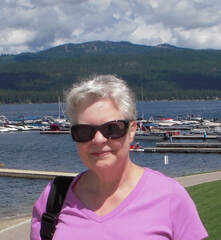(FLASH ESSAY)
WIND SONG
KARLENE BAYOK EDWARDS
WIND SONG
KARLENE BAYOK EDWARDS
The pines make a music like no other…. -Philip Levine
It’s like a wordless singing. A humming song inside the branches. Sometimes when the wind blows at night, the pines seem to lament. Perhaps they dream of gathering their roots and flying, as they did when the world was young. Perhaps they remember floating over the earth as seeds, aloft on translucent wings.
My ears still search for the sound wind makes in the pines where I grew up. Since moving to the city, I am surrounded by tall buildings, asphalt, traffic. I can no longer step outside my door to hear the wind’s soft breath around me. I think I miss that Idaho sound more than any other.
We lived a mile from the tiny mountain community of McCall and beyond us lay the stillness of wilderness and wildflowers all the way down the canyon to New Meadows. Behind our grey-brick home, ponderosas rose sixty feet tall and sheltered a rare troupe of flying squirrels. On the opposite side of the house, two grand firs stood watch over a trail descending deep into the woods. These were the trees where the wind sang to my brother and sister and me.
Even fifty years later, and far away in Phoenix, I remember. It begins softly, whispering in the tree tops, murmuring among the lower branches, lifting cone-laden boughs skyward like ballerinas.
I have found a word to express how I feel when I hear wind in the pines. Soughing. An old Southern word pronounced to rhyme with bough and defined as an odd keening sound of wind in the trees, or waves rushing ashore, except wind is never rhythmic. It never repeats itself. It rises at its own whim and sings its own elusive harmony.
Last summer I drove out of the city, and with my sister, Barbara, traveled a hundred miles to the ponderosa pines atop Mingus Mountain. We brought out sandwiches and lemonade and caught up with our separate lives.
Then, as we so often do, we retold childhood tales, and discovered, once again, how differently we perceived our upbringing. It wasn’t only because Barbara is six years older than I am, but because she was born fifteen months after Dad’s return from prison camp in Japan. Because she watched him weep as he crafted a tiny casket for a son born too early. Because I was not there to hold these memories with her.
Yet, when the wind rose, joyous, humming in the pine boughs above us, we both closed our eyes. Miles from Idaho, and years from childhood, we both stopped in recognition.
To listen.
It’s like a wordless singing. A humming song inside the branches. Sometimes when the wind blows at night, the pines seem to lament. Perhaps they dream of gathering their roots and flying, as they did when the world was young. Perhaps they remember floating over the earth as seeds, aloft on translucent wings.
My ears still search for the sound wind makes in the pines where I grew up. Since moving to the city, I am surrounded by tall buildings, asphalt, traffic. I can no longer step outside my door to hear the wind’s soft breath around me. I think I miss that Idaho sound more than any other.
We lived a mile from the tiny mountain community of McCall and beyond us lay the stillness of wilderness and wildflowers all the way down the canyon to New Meadows. Behind our grey-brick home, ponderosas rose sixty feet tall and sheltered a rare troupe of flying squirrels. On the opposite side of the house, two grand firs stood watch over a trail descending deep into the woods. These were the trees where the wind sang to my brother and sister and me.
Even fifty years later, and far away in Phoenix, I remember. It begins softly, whispering in the tree tops, murmuring among the lower branches, lifting cone-laden boughs skyward like ballerinas.
I have found a word to express how I feel when I hear wind in the pines. Soughing. An old Southern word pronounced to rhyme with bough and defined as an odd keening sound of wind in the trees, or waves rushing ashore, except wind is never rhythmic. It never repeats itself. It rises at its own whim and sings its own elusive harmony.
Last summer I drove out of the city, and with my sister, Barbara, traveled a hundred miles to the ponderosa pines atop Mingus Mountain. We brought out sandwiches and lemonade and caught up with our separate lives.
Then, as we so often do, we retold childhood tales, and discovered, once again, how differently we perceived our upbringing. It wasn’t only because Barbara is six years older than I am, but because she was born fifteen months after Dad’s return from prison camp in Japan. Because she watched him weep as he crafted a tiny casket for a son born too early. Because I was not there to hold these memories with her.
Yet, when the wind rose, joyous, humming in the pine boughs above us, we both closed our eyes. Miles from Idaho, and years from childhood, we both stopped in recognition.
To listen.

Karlene Bayok Edwards’ stories appear in Idaho Magazine. She writes from vivid memories of her wild Idaho childhood, and from her new life in the Arizona desert. A former librarian and forever book lover, she co-facilitates a writing group in the Phoenix area. She still dreams of mountains.
Karlene Bayok Edwards’ stories appear in Idaho Magazine. She writes from vivid memories of her wild Idaho childhood, and from her new life in the Arizona desert. A former librarian and forever book lover, she co-facilitates a writing group in the Phoenix area. She still dreams of mountains.